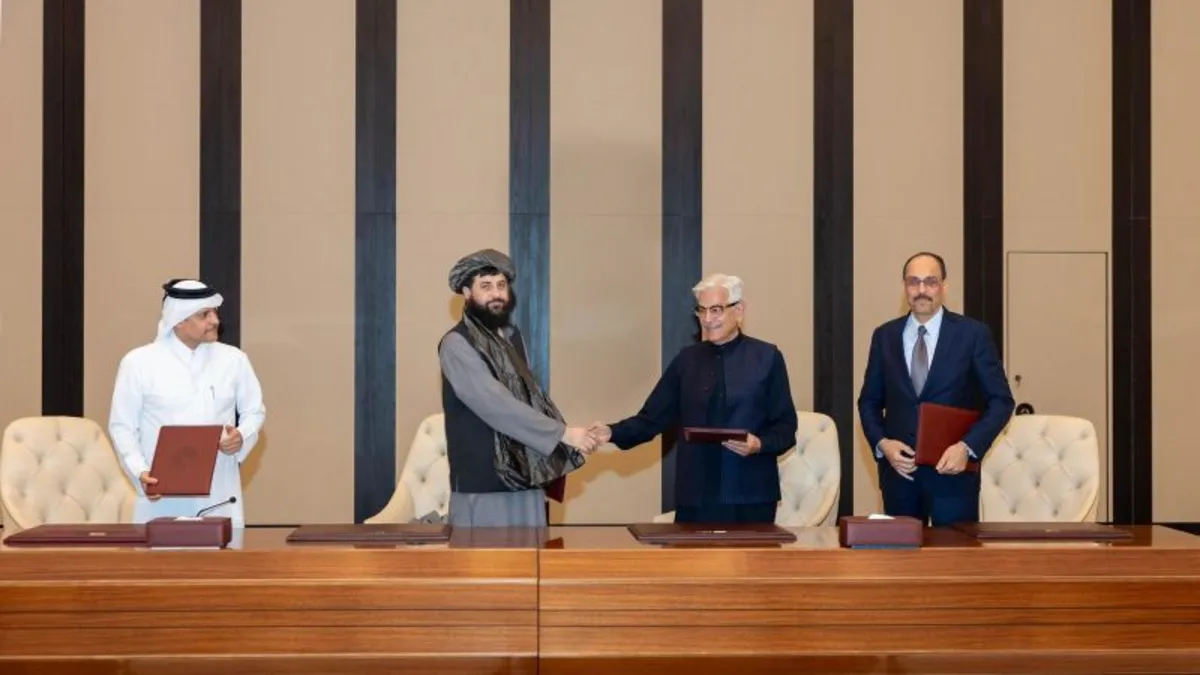
In a significant development, Pakistan and Afghanistan have agreed to an immediate ceasefire during high-stakes negotiations in Doha, as reported by Qatar’s foreign ministry early Sunday. This resolution comes after a week filled with deadly clashes, which persisted despite a previous truce. The parties involved have committed to halt hostilities and pursue “lasting peace and stability,” with mediation efforts led by Qatar and Turkey.
The announcement follows accusations from Afghanistan’s Taliban leadership, which claimed that Pakistan had conducted airstrikes on its territory. This escalation marks one of the most severe periods of fighting between the two nations since the Taliban regained control in Kabul in 2021. The violence, concentrated along the disputed 1,600-mile border, erupted on October 10 after Afghanistan alleged that Pakistani forces had initiated airstrikes in Kabul, prompting retaliatory attacks from Afghan forces.
Pakistan has persistently accused Kabul of providing sanctuary to the Pakistani Taliban militant group, known as the TTP, a claim that the Afghan government vehemently denies. In a bid to ensure peace, the ceasefire agreement stipulates that Kabul will refrain from supporting groups that conduct attacks against the Government of Pakistan. Both nations have also committed to avoiding any actions that could harm each other’s security forces, civilians, or critical infrastructure, as outlined by Taliban spokesperson Zabiullah Mujahid.
Initially, both countries had agreed to a 48-hour ceasefire on Wednesday, which was a temporary measure following days of intense clashes that resulted in significant casualties on both sides. This ceasefire was extended on Friday in light of ongoing mediation efforts, yet violence persisted. Ahead of the latest talks, the Taliban confirmed that a high-level delegation, led by Afghanistan’s defense minister, was en route to Doha.
During this period, the Taliban accused Pakistani forces of conducting airstrikes that targeted civilian areas in the border province of Paktika. Despite reserving the right to respond to such violations, Mujahid emphasized that Afghan forces would refrain from launching new military operations to maintain the integrity of their negotiating position.
Pakistan’s information minister, Attaullah Tarar, responded to the accusations, stating that Pakistani security forces had targeted “verified” camps of Islamist militants along the border, denying any intent to strike Afghan civilians. He labeled the claims of civilian targeting as false, asserting that they were intended to garner support for terrorist groups operating from within Afghanistan. Tarar also reported that militants had attempted to attack Pakistan during the ceasefire, resulting in the deaths of over 100 fighters, although CNN has not verified this information.
The ongoing violence has also affected Afghanistan’s sports community. The Afghanistan Cricket Board reported that eight individuals, including three cricket players, were killed in a Pakistani attack in Paktika. The players were targeted during a gathering after returning from a friendly match. In light of these tragic events, the board announced that Afghanistan would withdraw from an upcoming three-nation T20I cricket tournament involving Pakistan and Sri Lanka.
The recent clashes between Pakistan and Afghanistan represent the deadliest escalation since the U.S. withdrawal from Afghanistan in 2021. This spike in violence could indicate a new era of instability for the once-friendly neighbors. Historically, Pakistan has been a significant backer of the Taliban following its ousting by NATO forces in 2001 and during the Taliban's subsequent insurgency against the U.S.-backed Afghan government. However, the TTP’s resurgence has become one of Pakistan's most pressing national security concerns, with reports indicating that the group has executed approximately 600 attacks against Pakistani forces in the past year, according to data from the independent nonprofit Armed Conflict Location & Event Data (ACLED).